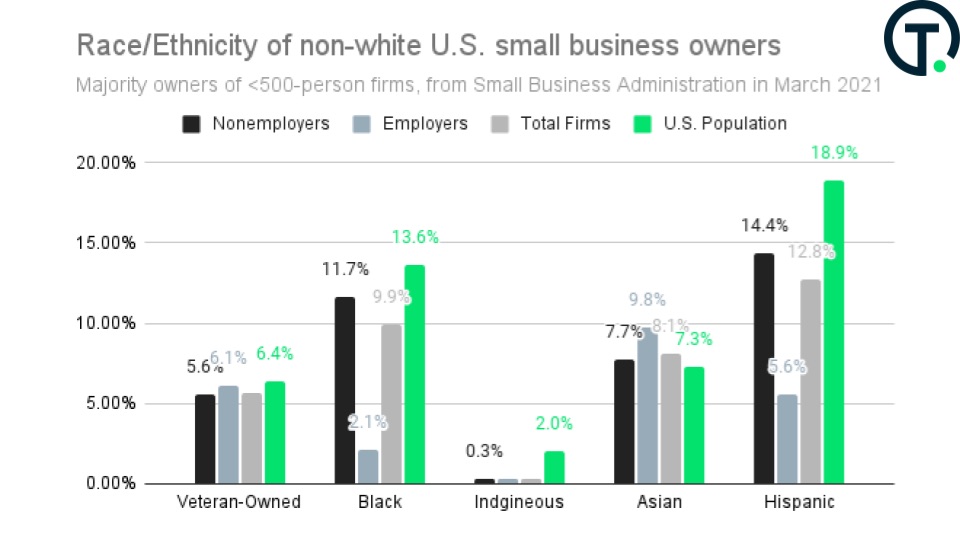
Written by Technically Media CEO Chris Wink, Technical.ly’s Culture Builder newsletter features tips on growing powerful teams and dynamic workplaces. Below is the latest edition we published. Sign up to get the next one.
One of the stranger trends in my social media feeds is the many videos and threads on opening up LLCs.
Scroll through the content; what stands out to me is just how many different kinds of people seem excited to give guidance on tax compliance. Across ages, races and genders, social posters want me to start a company — and they seem very enthusiastic about this.
Incorporating a business is an inherently optimistic act, and it remains a stubborn if besieged part of the American identity. Despite declines during the pandemic, most US demographic groups still view capitalism more favorably than socialism, according to the latest polling from Pew Research. (Black people and those aged 18-29 are exceptions, though both of those groups’ opinions change depending on income, gender and level of education.)
These social media exhortations are accurate in one sense: starting a company in the United States is relatively easy. The last three years of the pandemic had more new business activity than any similar period in decades, according to the latest analysis. Women and people of color led the way, flipping another long-standing trend.
US entrepreneurs are a diverse bunch, but they don’t grow equally
The problem is what happens next, argues Dr. Lomax Campbell, founder of consultancy Third Eye Network and a former city government executive.
“Historically we’ve taken universal approaches to supporting entrepreneurs at different stages of development,” Campbell told Technical.ly. “Oftentimes efforts are a mile wide and an inch deep.”
Not all business incorporation is the same, though. In one sense, entrepreneurship in the United States is relatively diverse and became more representative over time. Almost 12% of all companies are Hispanic-owned, and close to 1 in 10 are Black-owned, according to a 2021 analysis by the U.S. Small Business Administration (SBA). Those proportions aren’t so far off these demographic groups’ share of the American population as a whole.
But the demographic gaps grow when we look specifically at companies with employees and larger annual revenues: White and Asian Americans are slightly more represented in business ownership than they are in the general population, yet own an even greater share of bigger companies.
Put simpler: although Black and Hispanic Americans start a good number of companies, they are less likely to grow them. Not everyone wants what comes with a bigger company, but it matters for those who see entrepreneurship as a tool to combat racial wealth inequality, among other influences.

How to help more entrepreneurs grow: Get more specific
Campbell, who started a creative agency before developing an entrepreneurial engagement strategy for his home city of Rochester, New York, now advises economic development efforts around the country. He argues that supporting business today — especially with an eye toward so-called inclusive entrepreneurship — requires more targeted programs and resources for entrepreneurs at different stages of development.
“It’s not uncommon [that a city’s small business] capacity-building training program will have seasoned business owners in the room with new business owners, with people who are still thinking about starting a business in the room,” said Campbell.
That might sound sensible from afar, but it’s like putting high school, college and graduate students in the same classroom.
Campbell advises we think of business engagement in four stages:
- Start up: The company’s incorporation, initial goals and target market
- Stay up: Its acquisition of customers and development of processes
- Scale up: Its effort to invest and grow, via outside financing or otherwise
- Split up: Its end-state, whether that be succession, merger or acquisition, so it doesn’t have to end with the entrepreneur
“You need to differentiate the resources that you are providing to entrepreneurs both based on where they are in their trajectory and based on what their goals are,” he said.
One of the clearest delineations to make between businesses is those with employees and those without them.
Almost 32 million small businesses are incorporated in the United States, and 81% or 25.7 million of them have no employees at all, according to the SBA. These “nonemployers,” or “solopreneurs,” could include consultants, carpenters and the country’s estimated 17 million full-time gig workers — part of a $1.3 trillion freelance economy. (For context, the majority of Americans work at just 20,000 companies that have 500 or more employees, which the SBA constitutes as “large.”)
Self-employed professionals with no plans to expand, restaurant owners that hire in one location and entrepreneurs intending to grow as big and fast as possible all require very different support — and each category compels different approaches depending on how far along they are. Overall, Campbell believes that the next stage for cities to boost entrepreneurial engagement is to provide more targeted resources and education to founders at different stages of development, to better support their growth and success. You can’t get all of that on TikTok.
“It’s important to get that level of depth because a lot of times, people that run programs don’t give the whole story,” Campbell said. “We have so much more work to do.”
Sign up for the Culture Builder newsletterJoin the conversation!
Find news, events, jobs and people who share your interests on Technical.ly's open community Slack

Philly daily roundup: Women's health startup wins pitch; $204M for internet access; 'GamingWalls' for sports venues

Delaware daily roundup: Delmarva Power vendor stats; DelDOT's $15M federal grant; 50 best companies to work for

DC daily roundup: Inside UMCP's new ethical AI project; HBCU founder excellence; a big VC shutters MoCo office


